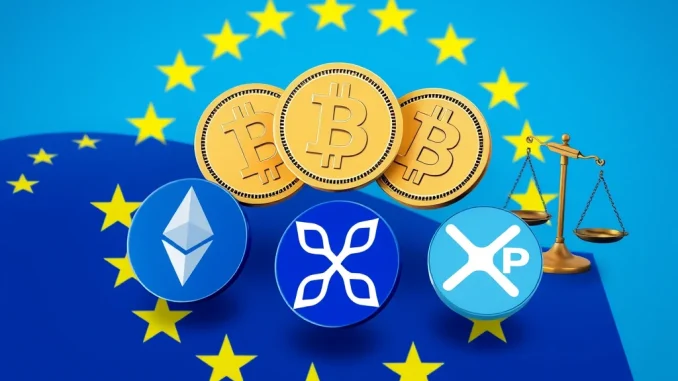
The European Union’s Markets in Crypto Assets (MiCA) regulation is set to reshape the crypto landscape across member states. But a key clarification from a prominent regulator highlights that not all digital assets will fall under its direct purview. This is particularly significant for major cryptocurrencies like Bitcoin and Ethereum.
Understanding MiCA Regulation
MiCA is designed to provide a comprehensive legal framework for crypto-assets and related activities within the EU. Its primary goals include protecting investors, ensuring market integrity, and fostering innovation under clear rules. It covers aspects like crypto-asset issuance, trading platforms, and service providers.
However, the scope of MiCA is defined by the types of crypto-assets it regulates, primarily focusing on those with an identifiable issuer or provider responsible for their creation and operation.
Why Bitcoin and Ethereum Fall Outside MiCA’s Scope
A crucial point was recently made by Mary-Elizabeth McMunn, the Central Bank of Ireland’s deputy governor. She stated that both Bitcoin and Ethereum are currently not subject to MiCA regulation. The reason? They lack an identifiable issuer.
Bitcoin, created pseudonymously by Satoshi Nakamoto, operates on a decentralized network with no single entity controlling it. Similarly, while Ethereum was initiated by vitalik Buterin and others, its network is also decentralized, with no single company or individual serving as its ‘issuer’ in the traditional sense.
This distinction is fundamental to how MiCA categorizes and regulates crypto assets. If there’s no specific entity responsible for the asset’s creation or maintenance in a centralized manner, applying issuer-focused regulations becomes challenging or irrelevant.
The Central Bank of Ireland’s stance clarifies the regulatory position on these two major cryptocurrencies within the EU context governed by MiCA.
The Central Bank of Ireland’s Stance Clarified
The statement from the Central Bank of Ireland’s deputy governor provides valuable clarity for the crypto market. It confirms that for assets like Bitcoin and Ethereum, which function through decentralized networks without a single point of control or issuance, the specific requirements under MiCA targeting issuers will not apply.
This does not mean Bitcoin and Ethereum are entirely unregulated in the EU. Activities involving these assets, such as trading on exchanges or custody services, will still be subject to MiCA rules as they pertain to crypto-asset service providers (CASPs). However, the assets themselves are not classified in a way that triggers issuer-specific obligations.
How XRP Differs Under MiCA
In contrast to Bitcoin and Ethereum, other crypto assets do have identifiable issuers. The report mentioning the Central Bank of Ireland’s view also highlighted commentary suggesting XRP, associated with Ripple Labs, has an identifiable issuer. This distinction is critical.
Because XRP has a clear entity involved in its creation, distribution, and ecosystem development, it is likely to be treated differently under MiCA. Assets with identifiable issuers could be classified as ‘asset-referenced tokens’ or ‘e-money tokens’, depending on their design, bringing them under specific regulatory requirements related to stability, reserves, and issuer obligations.
This difference underscores how MiCA’s framework differentiates between truly decentralized assets and those with a degree of centralized control or issuance.
Implications and What’s Next?
This clarification from the Central Bank of Ireland regarding Bitcoin MiCA and Ethereum MiCA status is important for several reasons:
- For Investors: It helps understand which assets are subject to which parts of MiCA. While BTC and ETH issuers aren’t regulated, the platforms you use to buy or hold them will be.
- For Service Providers: CASPs dealing with Bitcoin and Ethereum must still comply with MiCA’s rules for their services (exchanges, wallets, etc.), even if the assets themselves aren’t regulated at the issuer level.
- For Other Assets: It reinforces that assets with identifiable issuers, like XRP MiCA might be subject to a different, potentially stricter, set of rules under MiCA.
The regulatory landscape continues to evolve, but this guidance provides a clearer picture of how major decentralized cryptocurrencies fit within the EU’s new framework.
Conclusion
The statement from the Central Bank of Ireland’s deputy governor confirms that Bitcoin and Ethereum’s decentralized nature places them outside the scope of MiCA’s issuer-focused regulations. This contrasts with assets like XRP, which, having an identifiable issuer, are likely to face different classifications and requirements under the same framework. While Bitcoin MiCA and Ethereum MiCA issuer rules don’t apply, the services around them will. This distinction is vital for understanding the practical application of Europe’s landmark crypto regulation.



